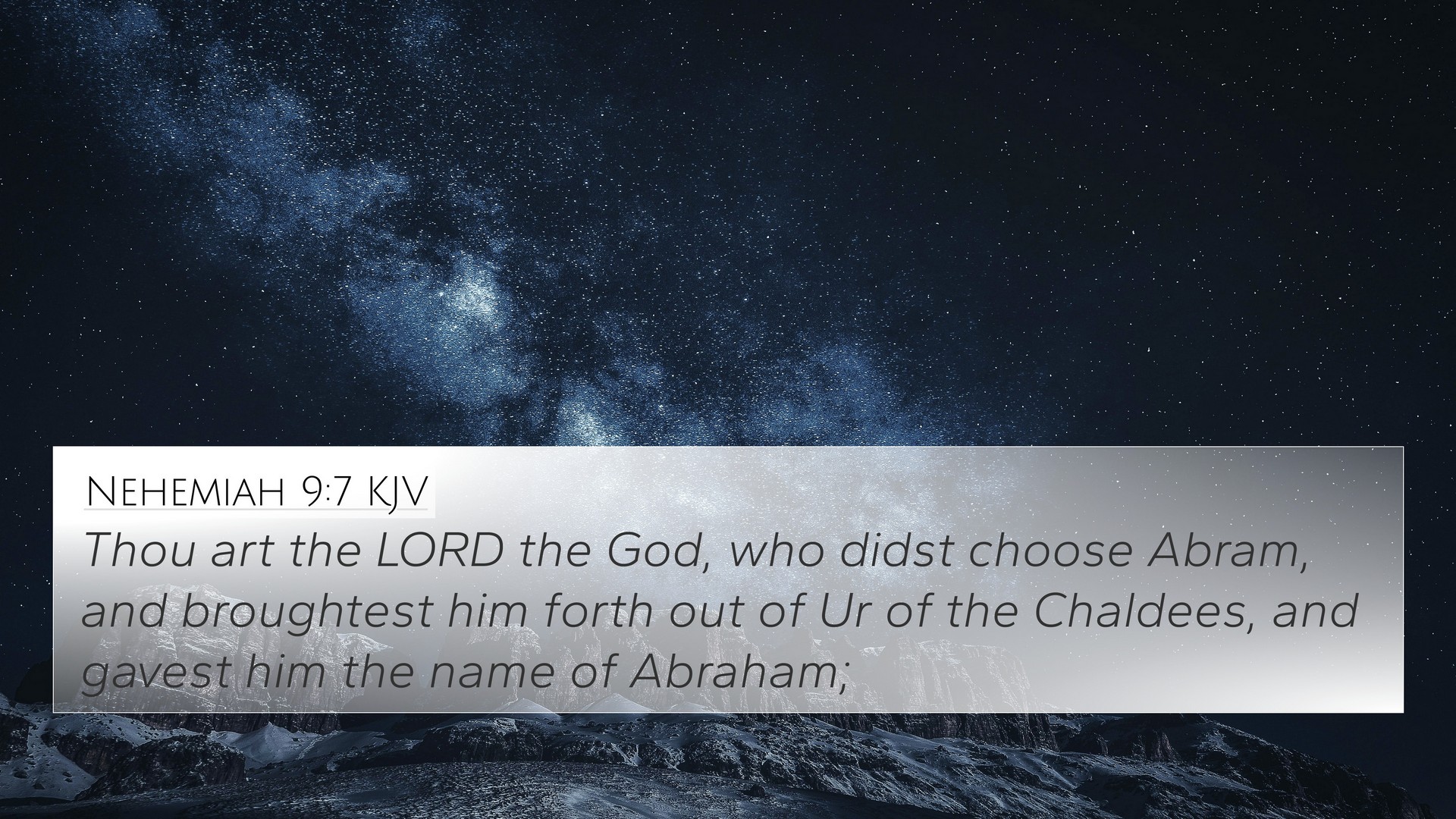Understanding Nehemiah 9:7
Text of Nehemiah 9:7: "Thou art the Lord the God, who didst choose Abram, and broughtest him forth out of Ur of the Chaldees, and gavest him the name of Abraham."
Overview
The verse emphasizes God's sovereignty and His covenant relationship with Abraham, highlighting the significance of divine selection and guidance. This passage is foundational for understanding biblical themes of election and faith.
Commentary Insights
Matthew Henry: Henry notes that this verse reflects God's initiative in choosing Abraham. By bringing him out of Ur, God demonstrates His power to set apart individuals for His purpose. This choice underscores the grace of God, as Abraham was called from a pagan background to become the father of a nation.
Albert Barnes: Barnes elaborates on the historical context and significance of God’s choice of Abraham. He emphasizes that this act was not based on Abraham’s merit, but rather on God's sovereign will. This reinforces the idea that God's plans are often beyond human understanding and are executed through His chosen vessels.
Adam Clarke: Clarke presents a detailed examination of the name change from Abram to Abraham, indicating that the latter signifies "father of a multitude." This transformation reflects the promises God made to Abraham and sets the stage for understanding the unfolding covenant narrative in scripture.
Connections to Other Bible Verses
Nehemiah 9:7 connects with several other scriptures, forming a network of thematic Bible verse connections. Here are some significant Bible verse cross-references:
- Genesis 12:1-3: The call of Abram and the promises of land and blessing.
- Genesis 15:5: God’s promise to Abraham regarding his descendants.
- Isaiah 51:2: A reminder of Abraham’s faith and God’s choosing.
- Romans 4:3: Discussion of Abraham's faith being credited as righteousness.
- Galatians 3:6-9: Emphasis on faith and how all who believe are children of Abraham.
- Hebrews 11:8-10: Abraham’s faith in following God’s calling.
- James 2:23: Abraham's justification by faith is highlighted.
Thematic Analysis
This verse serves as a foundation for understanding the covenantal themes that run throughout the Bible. The selection of Abraham signifies the initiation of God's redemptive plan, which includes the establishment of Israel as a chosen people.
Faith and Obedience
The narrative around Abraham emphasizes the importance of faith and obedience in one's relationship with God. Nehemiah 9:7 serves as a reminder of how faith leads to divine favor and purpose.
Covenantal Relationship
The covenant between God and Abraham is pivotal in understanding subsequent biblical narratives. It highlights God’s faithfulness and the blessings that come through obedience to His word.
Divine Sovereignty
This verse illustrates the concept of divine sovereignty in human affairs. God’s choice of Abraham was not incidental but rather a purposeful act that would affect generations.
Cross-Referencing Recognized Themes
When cross-referencing biblical texts, the themes present in Nehemiah 9:7 align with various sections of scripture:
- The Journey of Faith: The lifelong journey of faith begins with God's call (Genesis 12).
- The Importance of Obedience: Abraham’s obedience as a model for believers today.
- God’s Promises: Assurance of God’s promises being fulfilled through faith.
Using Cross-References for Deeper Understanding
Tools for Bible cross-referencing can enhance biblical study by connecting themes and lessons throughout scripture. The study of Nehemiah 9:7 encourages readers to seek deeper connections:
- Bible Concordance: Utilize a concordance to find related themes.
- Bible Cross-Reference Guide: Aid in exploring interconnected verses.
- Bible Chain References: Follow thematic chains through various books.
Conclusion
Nehemiah 9:7 not only recounts a historical fact but also serves as a profound theological statement about God's nature and His interaction with humanity, particularly through the figure of Abraham. By connecting this verse to others, we deepen our understanding of the overarching narrative of scripture which emphasizes faith, obedience, and divine sovereignty.











